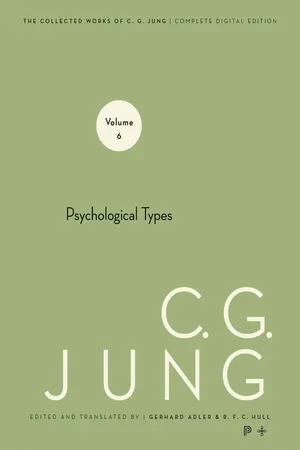
Collected Works of C. G. Jung, Volume 6
Psychological Types
- 640 pages
- English
- ePUB (mobile friendly)
- Available on iOS & Android
Collected Works of C. G. Jung, Volume 6
Psychological Types
About this book
One of the most important of Jung's longer works, and probably the most famous of his books, Psychological Types appeared in German in 1921 after a "fallow period" of eight years during which Jung had published little. He called it "the fruit of nearly twenty years' work in the domain of practical psychology," and in his autobiography he wrote: "This work sprang originally from my need to define the ways in which my outlook differed from Freud's and Adler's. In attempting to answer this question, I came across the problem of types; for it is one's psychological type which from the outset determines and limits a person's judgment. My book, therefore, was an effort to deal with the relationship of the individual to the world, to people and things. It discussed the various aspects of consciousness, the various attitudes the conscious mind might take toward the world, and thus constitutes a psychology of consciousness regarded from what might be called a clinical angle."
In expounding his system of personality types Jung relied not so much on formal case data as on the countless impressions and experiences derived from the treatment of nervous illnesses, from intercourse with people of all social levels, "friend and foe alike," and from an analysis of his own psychological nature. The book is rich in material drawn from literature, aesthetics, religion, and philosophy. The extended chapters that give general descriptions of the types and definitions of Jung's principal psychological concepts are key documents in analytical psychology.
Frequently asked questions
- Essential is ideal for learners and professionals who enjoy exploring a wide range of subjects. Access the Essential Library with 800,000+ trusted titles and best-sellers across business, personal growth, and the humanities. Includes unlimited reading time and Standard Read Aloud voice.
- Complete: Perfect for advanced learners and researchers needing full, unrestricted access. Unlock 1.4M+ books across hundreds of subjects, including academic and specialized titles. The Complete Plan also includes advanced features like Premium Read Aloud and Research Assistant.
Please note we cannot support devices running on iOS 13 and Android 7 or earlier. Learn more about using the app.
Information
INDEX
Table of contents
- Cover
- Halftitle
- Title
- Copyright
- Editorial Note
- Contents
- Foreword to the First Swiss Edition
- Foreword to the Argentine Edition
- Introduction
- I. The Problem of Types in the History of Classical and Medieval Thought
- II. Schiller’s Ideas on the Type Problem
- III. The Apollinian and the Dionysian
- IV. The Type Problem in Human Character
- V. The Type Problem in Poetry
- VI. The Type Problem in Psychopathology
- VII. The Type Problem in Aesthetics
- VIII. The Type Problem in Modern Philosophy
- IX. The Type Problem in Biography
- X. General Description of the Types
- XI. Definitions
- Epilogue
- Appendix: Four Papers on Psychological Typology
- Table: Correlation of Paragraph Numbers
- Bibliography
- Index
- Footnotes